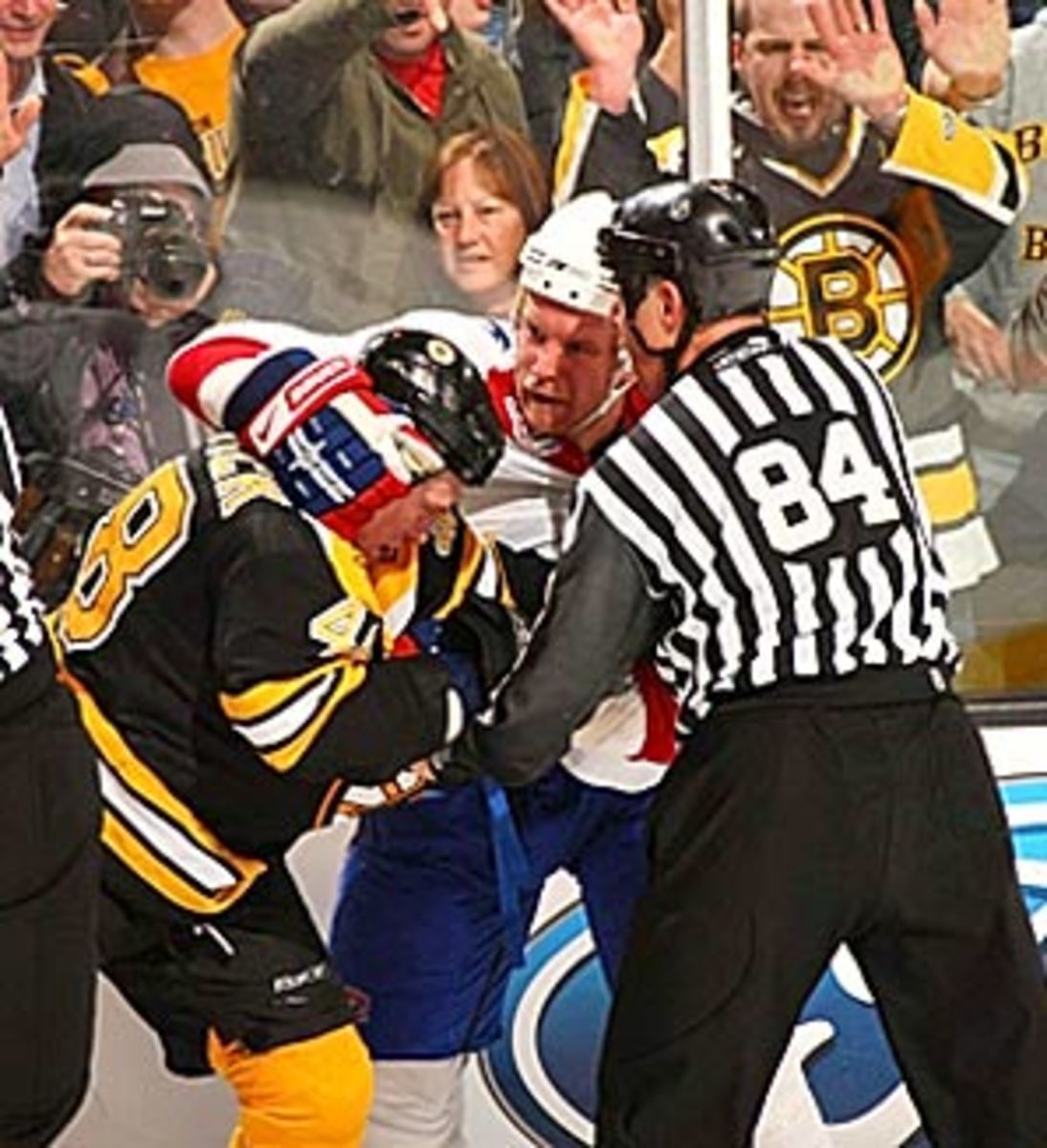Bruins demand a ban for an eye
The rate at the Marriott Copley in Boston on Wednesday and Thursday night was $100. When asked what it would be for Friday, the first night of Patriots Day Weekend, which includes the Boston Marathon, a helpful desk clerk said $399 -- with a straight face.
Now that is gouging.
Bruins general manager Peter Chiarelli was in high dudgeon, or, more correctly, in the stands at the team's practice rink north of the city on Friday. He was contending that the NHL should have suspended Montreal Canadiens defenseman Mike Komisarek for gouging the right eye of Boston's Matt Hunwick. The eye was indeed a mess, a three-rounds-with-Mike Tyson peeper with a discolored eyelid and an ochre half moon scratch that looked as if it would turn into a painted-desert sunset.
Hunwick, a rookie defenseman, said he had no vision problems from the incident at the end of Game 1, a 4-2 Boston win. He explained he was trying to exchange facewashes with Komisarek and would have to look at the videotape to see if there were some actual old-fashioned eye-gouging going on.
Now, you would think that he would have had a better vantage point than a video camera operator -- if some large guy in a hockey sweater had been rummaging around in your eye socket 15 hours earlier, you might recall it -- but Hunwick swore that he couldn't be sure. He did, however, pick up the flying elbow that Canadiens forward Tom Kostopoulos threw in his direction, one that narrowly missed grazing Hunwick's chin. No autopsy, no foul.
There was another instance in the sort of late-game tomfoolery that the NHL had warned GMs about in a conference call last Monday: Canadiens forward Maxim Lapierre assaulted the Bruins' Phil Kessel along the boards in the final minute after Kessel had displayed the effrontery of scoring a goal into an empty net -- but it was Hunwick's boo-boo that had the Bruins boss most concerned.
Like your mother said, you could poke somebody's eye out.
"Playoff hockey," Komisarek said, a smile on his face. "Facewashes happen" -- I smell a marketing opportunity for an NHL-licensed bumper sticker here -- "every other shift. I don't know if the kid's got gentle skin or what. But it's playoff hockey. I've never been a guy who's Moe, Larry, Curly, trying to poke somebody's eye out."
Can we get a nyuk, nyuk, nyuk from the congregation?
And remember, one hand always facewashes the other.
Now where were we?
Right -- the NHL's decision to crack down on the last-minute shenanigans, the "message-sending" that, as one Montreal veteran allowed, "sets up the next game."
I have always found these bully moments exercises in self-indulgence, an acting out of personal or team frustration. If they want to "send a message," they could call or text or Twitter -- "I am going to pound your ... (how close am I to my 140 characters?)" -- but trying to win a war when the game is over is futile. The NHL apparently agrees, which prompted the decision to suspend the Flyers' Daniel Carcillo and, more tellingly, hit coach John Stevens with a $10,000 fine for their roles in the ending of the Penguins' Game 1 win against Philadelphia.
The Carcillo and Komisarek situations are comparable, obviously, given the time on the clock, but the closer you look at them in context, the more the nuances become apparent. For one thing, with six seconds left, Pittsburgh skating five-on-three and a faceoff in the neutral zone, Stevens sent out Carcillo, a tough-guy winger, to take the draw. Carcillo never kills penalties and never takes draws. Maybe that explains why he missed the puck and slashed the hands of Penguins center Maxime Talbot. The act might have been vintage Philadelphia vitriol, but the NHL wasn't going to let it slide.
Now, there was some disturbing behavior at the end of Boston-Montreal playoff opener -- "I don't think it's the way we would have handled ourselves," Bruins' goalie Tim Thomas observed -- but the circumstances were a little different. Unlike Carcillo, who's had a prior suspension, Komisarek doesn't have a rap sheet. And just seven days earlier, in a regular-season game that was meaningless to Eastern Conference-leading Boston but pivotal for the Canadiens' playoff chances, the Bruins declared open season on their historic rivals. A modified gong show ensued.
"That was a game out of the 1970s," an Eastern Conference GM told me the next day. He meant it as a compliment. The almost three-hour affair, with its doses of toned-down but still gratuitous violence, looked completely out of place in the modern NHL, which perhaps explains why so many people were unstinting in their praise of this old-time hockey match. The Bruins got their whacks in that night. The Canadiens were sort of evening the score.
This is the dilemma: The NHL can't allow the end-game circus, but it can't leech all of the emotion out of the playoffs, either. These two months are based on skill but rooted in passion. If you sanitize the NHL, you run the risk of doing even more damage to the game than by allowing the silliness. The hockey operations department in Toronto has the tricky task of sorting all this out, trying to identify where the line is before it can assess when it has been crossed.
Good luck to them.
Me, I'm on my way to check into a different hotel at $229 a night.






